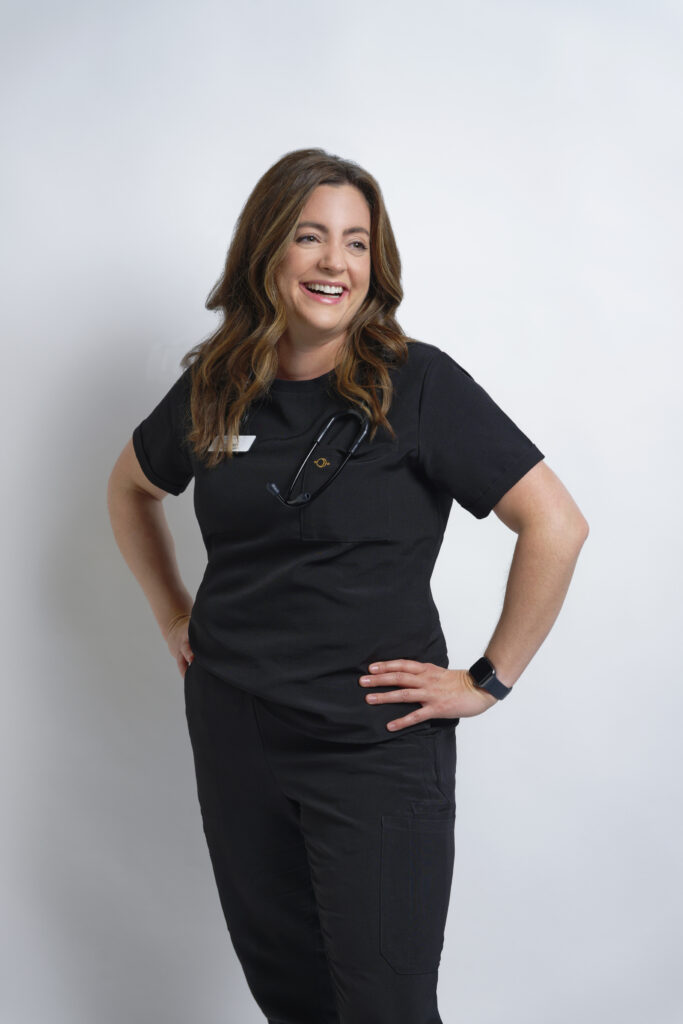Innovative physiotherapy for cardiac patients
Lauren Park: Physiotherapist, Allied Health, Foothills Medical Centre.
Lauren Park is a physiotherapist who has dedicated her career to helping patients recovering in the Cardiovascular Intensive Care Unit (CVICU) at Foothills Medical Centre. Her commitment to innovating and improving physiotherapy practices after heart surgery is what makes Lauren a Hero in Health!
The Heroes in Health initiative encourages patients and their families to give back in thanks for the extraordinary care they’ve received. To donate and nominate your health hero, visit our website.

After completing her Bachelor’s degree in Kinesiology from the University of Calgary, her intention was to go into medicine and become a doctor. She decided to take a year off to evaluate if that was truly her passion. In the interim she worked as a personal trainer.
“I worked with a number of clients considered “weekend warriors” looking for advice after injuring themselves playing sports with their families. At the time I lacked the expertise to help them and that experience is what lead me to physiotherapy – giving me the opportunity to combine my love of sport with the field of medicine.” Lauren said.
She applied and was accepted for the Physiotherapy program at the University of Alberta. When she first started, she was unaware of physiotherapy’s role in hospital care.
“My intent was to be a sports physiotherapist but through my student clinical placements, I worked in several acute care areas including three placements at Foothills Medical Centre. One of these was in the trauma ICU, and that’s when I fell in love with working in the hospital environment”
After finishing her Masters degree, she began working in a temporary role in the trauma ICU. Shortly after, she accepted a position in the CVICU, helping patients who underwent open heart surgery. She has dedicated 15 years to CVICU at Foothills.
“I saw an opportunity to improve post-operative care for patients and felt it was worth the investment of time and effort to facilitate more successful patient outcomes.”
A notable accomplishment for her was instigating a research project that looked into the practice of sternal precautions in an effort to change the way physiotherapists teach movement strategies in patients recovering from open heart surgery. Traditionally, sternal precautions significantly restricted patient movement postoperatively.
“When you have open heart surgery, you end up with a cut down your breastbone and traditional precautions dictated that you could not use your arms to push or pull or lift more than five pounds for about six weeks.”
Lauren explained that these restrictions made it challenging to move patients through their hospital stay. Patients experienced reduced independence, increased anxiety and fear about moving and caregivers were concerned for burnout. Often, patients required additional days in hospital or would have to go to subacute rehab facilities because they lived alone and didn’t have the supports to facilitate living outside of a hospital environment.
Through the success of her research and the unit’s support, she changed the standard of care and implemented a new movement guideline called “Keep Your Move in the Tube”. By keeping their upper arms close to their body, as if they’re inside an imaginary tube, patients can modify load-bearing movements and avoid excessive stress to the sternum thus allowing safe healing.
Patients are encouraged to push themselves out of bed, as long as their arms are close by their sides. There isn’t a specific weight restriction, it’s all dependent on their pain. If the patient has sharp pain to their incision, they need to back off the activity. Essentially, pain is their guide.
“Keep Your Move in the Tube is a less restrictive approach compared to traditional sternal precautions, and allows for a much better experience and functional outcome. Patients are more able to return to their regular activities, feel better about their own recovery process and overall feel less depressed and dependent. Through our research, it was shown to be safe and no worse than what was being done before. It made patients and caregivers feel better,” Lauren explained.
Jennifer Donaldson, physiotherapy clinical lead and colleague of Lauren’s describes her as someone “who demonstrates leadership qualities within the Physiotherapy and Allied Health department and within her CVICU team. She is committed to improving patient care outcomes and quality of care. She strives to provide best patient care practices on a daily basis. Lauren was the first in Canada to implement this new standard of care following open heart surgery”.
Lauren consistently draws inspiration from seeking ways to enhance processes. She tries to see an area or something that can be improved on and if she can be a resource, she’s happy to work on it. In addition to her focus on continuous improvement, she sees her role as being centered on building relationships with the entire healthcare team.
“When you’re coming to someone’s bedside and want to get them moving, they usually don’t feel well or want to do physiotherapy. It’s a hard sell sometimes.”
She views relationship building as being pivotal to patient success and outcomes. Physiotherapists often spend extended periods of time with patients, making the development of a trust-based relationship essential for improving a patients’ well-being and experiences.
Thank you, Lauren, for your commitment to improving and innovating physiotherapy for cardiovascular intensive care patients. It is evident through all that you’ve accomplished, and continue to strive for, why you have been recognized as a Hero in Health.


